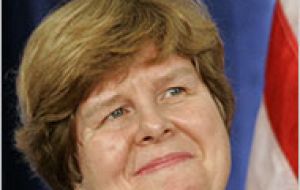MercoPress. South Atlantic News Agency
US priority: job creation over major fiscal consolidation
 White House Council of Economic Advisers Chairman Christina Romer
White House Council of Economic Advisers Chairman Christina Romer Reducing the United States budget deficit at the expense of creating jobs in a still-struggling economy would be “suicide,” a top White House adviser says.
White House Council of Economic Advisers Chairman Christina Romer said Sunday on NBC's “Meet the Press” that calls for reducing the deficit “in the middle of a crisis ... would just be suicide”. She added: “that's not what you do for an economy that is struggling to come back from the worst recession in post-war history”.
With some members of Congress voicing worries over adding to the United States' 1.4 trillion US dollars deficit through a new jobs creation bill, Romer made it clear the Obama administration would not choose “a major fiscal consolidation” over job creation efforts.
She warned that there would “very likely be further rises” in US unemployment levels before they come down, but added, “We're on the right trajectory. And I think what the president has committed to is doing all that we possibly can so that number comes down much more dramatically, because that is ultimately what we have to do.”
In the same program former Federal Reserve chairman Alan Greenspan said the Fed has done all it can do to reduce unemployment and needs to worry more about the risk of inflation from the stimulus it poured into the economy.
”I think the Fed has done an extraordinary job and it's done a huge amount (to bolster employment). There's just so much monetary policy and the central bank can do. And I think they've gone to their limits, at this particular stage“ Greenspan said on NBC's ”Meet the Press.“
”You cannot ask a central bank to do more than it is capable of without very dire consequences,“ Greenspan continued, saying the United States faced a serious long-term threat of inflation unless the Fed begins to pull back ”all the stimulus it put into the economy.“
Greenspan, who headed the central bank from 1987 to 2006, also expressed concern about a congressional effort he said would ”very significantly compromise“ the Fed's independence.
The House of Representatives on Friday passed sweeping financial reform legislation that includes a provision allowing a congressional watchdog agency to audit the Fed's monetary policy operations.
That reflects concerns the Fed did not do enough to head off the worst U.S. economic downturn since the Great Depression.
”What you will be getting is a monetary policy more dedicated to political short-term considerations, not to the longer-term considerations which the Federal Reserve Act is specifically constructed to do,“ Greenspan said.
Greenspan said he expected the U.S. unemployment rate, which is currently at 10 percent, to ”be significantly lower a year from now“ but still very high.
The U.S. Census Bureau's plan to hire close to 800,000 workers by April will take several tenths of a percent off the unemployment rate, he said.
The recovery in the stock market over the last six to nine months helps by putting many individuals and companies in a stronger position to spend money, he said.
The Federal Reserve will have to begin raising interest rates from current very low levels as both the economy and loan demand improve, he said.
”Remember, loan demand has been very dull because businesses are very heavily liquidating inventories. That's coming to a halt and when that happens loan demand will come back and the pressures on short-term interest rate will begin to grow,” Greenspan said.




Top Comments
Disclaimer & comment rulesCommenting for this story is now closed.
If you have a Facebook account, become a fan and comment on our Facebook Page!